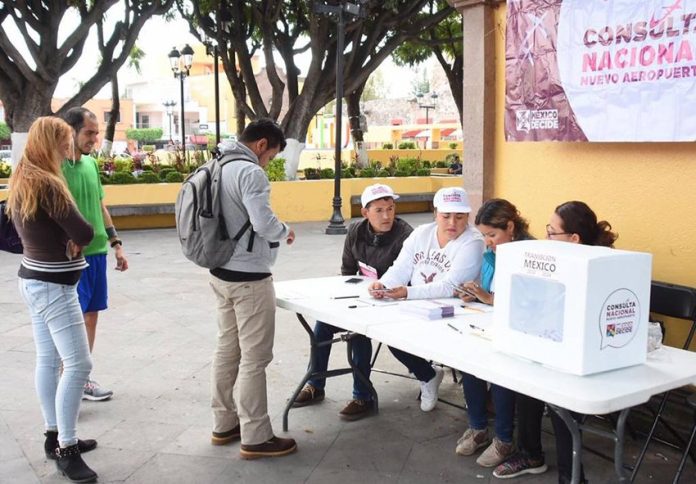The leaders of two of Mexico’s most influential business groups have spoken out against the incoming government’s public vote on the future of the new Mexico City International Airport (NAICM).
The public consultation, which asks citizens whether the current project at Texcoco, México state, should continue or whether two new runways should be built at the same state’s Santa Lucía Air Force Base, began Thursday and will conclude tomorrow.
Juan Pablo Castañon, president of the Business Coordinating Council (CCE), described the consultation process as “opaque and illegal,” charging that there is no guarantee that its result will be implemented by the new López Obrador-led government.
The process, he added, is not conducive to generating economic confidence.
“For all governments, it’s very important that their decisions, their acts of governance, generate confidence,” Castañón told attendees at a business event yesterday.
He also pointed to the deficiencies detected in the process, such as proof that some people have voted more than once, as further evidence of the consultation’s flaws.
In addition, the business leader rejected López Obrador’s claim that only the “corrupt and the cunning” want the vote to be cancelled.
“We have always thought that the participation of Mexicans to strengthen democracy is fundamental,” Castañón said, but criticized the procedure.
“We’re against how this consultation has been organized . . . After listening to the experts, seeing the different studies, [it’s clear] they are technical decisions so complex that it is difficult for any citizen . . .who isn’t an expert . . . to have the knowledge [required] to vote about the different alternatives.”
Castañón added that López Obrador and his team have made it clear that they are in favor of the Santa Lucía option.
“. . . That’s why we believe that this way of making decisions is not the correct one for this project in particular,” he said.
Castañón also claimed that the Santa Lucía base would be overwhelmed by passenger numbers in six or seven years whereas the NAICM would meet Mexico’s air travel needs for at least the next 45 years.
For his part, Gustavo de Hoyos, president of the Mexican Employers’ Federation (Coparmex), said in a Twitter post that he wouldn’t participate in the public vote.
“. . . It’s a useless consultation. I believe that it’s technical design is imperfect and the result will not be representative. I don’t have confidence in the impartiality of the exercise.”
De Hoyos told a press conference this week that if the new airport ends up being canceled, the ramifications will extend well beyond the contractors with interests in the project and the wider business sector.
“Who would lose if this project isn’t completed isn’t just one or two business people. In the long term, it’s Mexico who loses starting with the [new] government because . . . it will pay the compensation [to contractors] . . . We all lose but first the government.”
Mexico’s two largest banks, BBVA Bancomer and Citibanamex, have also warned that if the new government decides to scrap the US $15-billion airport, it will hurt private investment.
Source: El Universal (sp), El Economista (sp)
